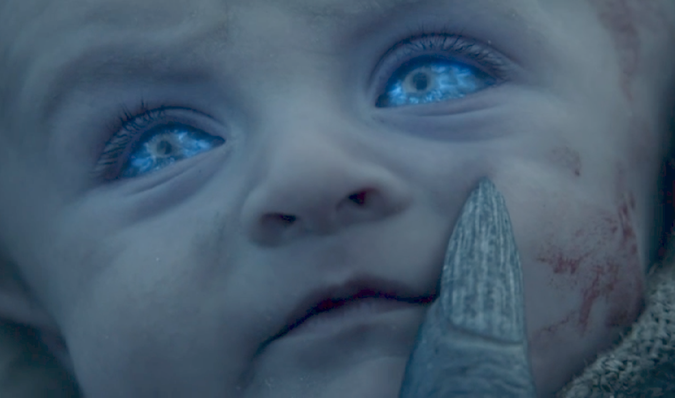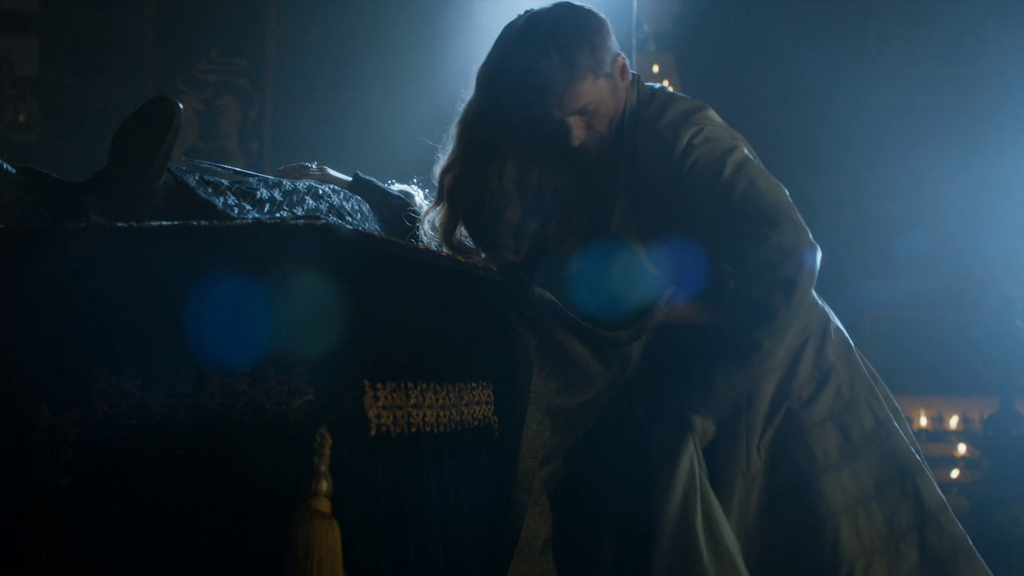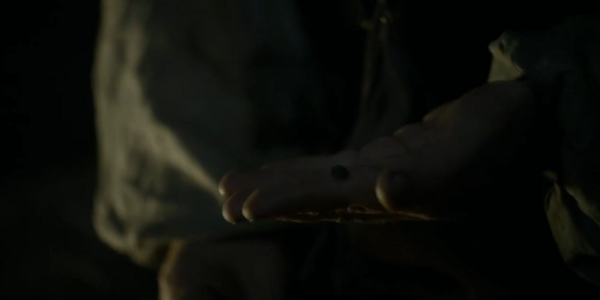 In the same weekend that parents around the nation watched their high-school and college students graduate and spread their wings for brighter shores, Game of Thrones served us up a season finale that was both about passages out of childhood, and about the shadow of parent-child relationships that follow people into their young-adulthoods.
In the same weekend that parents around the nation watched their high-school and college students graduate and spread their wings for brighter shores, Game of Thrones served us up a season finale that was both about passages out of childhood, and about the shadow of parent-child relationships that follow people into their young-adulthoods.
Similarly, it is safe to say Game of Thrones as a series came of age this season in its richness and complexity (while making mistakes along the way and learning from them). I don’t only mean the characters: Sansa Stark, who mid-season vaulted unexpectedly from girlish frailty to saucy, empowered womanhood; Daenerys Targaryen, who has gone from single-minded teen mother-of-cute-baby-dragons to a seasoned parent setting painful boundaries with her children (albeit inexpertly), and ejecting her surrogate father along the way; boy-king Tommen Barratheon, who has lost a brother, secured a fiance and assumed the throne all in a few weeks; Tyrion Lannister, who finally closed the door on his Daddy-issues; Arya Stark, who abandoned her de facto and would-be keepers and put the rudder to home and hearth in the majestic final moments of the season. And I don’t only refer to the way whatever leftover innocence we may have had as an audience has been increasingly shaken this season by the show-runners’ tricking us into cheering at the death of children or forcing us to confront the fact that honorable men can also be rapists.
Mostly what I mean is that the sprawling arc of the show is gradually, inexorably fulfilling the germ of its promise in the series’ opening scenes, maturing into the story it was born to be: a story of climate insecurity overlooked by the machinations of state-centric power politics. This was the tale Martin always meant to spin, this was where the series has been heading, and this arc has been intentionally dormant amidst the childish dramas of Westeros and Essos. In the season finale, the wildlings emerge as climate refugees; we are introduced to the Children of the Forest (synechdoche for indigenous populations and deep ecology); we are reminded that here be giants. If Game of Thrones is a metaphor for real-world politics, and if the metaphor is about global affairs instead of domestic politics, then it seems less like a story about Westphalian statebuilding and more like a 21st century metaphor for our frog civilization boiling in its hot, carbon-baked planetary pot. But I also refer to a few key moments in the show that tell us something about how the show is maturing, albeit imperfectly.
I have not blogged episode-by-episode about GoT this Spring (for that you can always follow Scott Eric Kaufman, Alyssa Rosenberg or Laura Hudson). But with the season now wrapped up, I do want to offer my take for what it’s worth on three of the season’s biggest moments. By big, I don’t mean best (though one tops my list) nor most controversial (though one probably counts) nor most important to the plot (really, how can we pick among twists? [non-book-fan SPOILER alert: the last twist from Storm of Swords at that link has not yet been revealed on the show.) Rather these are the scenes that made me, as a book fan, along with a significant portion of the Internet, stop and go some combination of “huh” and “um…” Here are my readings on what they meant and why they matter:
1) The Birth of Baby Walker.
 In the massive number of finale plot twists some of us may have forgotten that awkward moment earlier in the season when a White Walker makes off with a Craster baby, and we fear the worst. On what appears to be a sacrificial altar in some wildling Stonehenge, we prepare to watch the child die horribly, but instead a creature (dear God what is that thing? apparently this) gently transmogrifies it into a baby blue-eyed tribesmember. The scene, not in the books, levels the playing field for series and book fans, the latter of whom are seeing an important reveal for the first time:
In the massive number of finale plot twists some of us may have forgotten that awkward moment earlier in the season when a White Walker makes off with a Craster baby, and we fear the worst. On what appears to be a sacrificial altar in some wildling Stonehenge, we prepare to watch the child die horribly, but instead a creature (dear God what is that thing? apparently this) gently transmogrifies it into a baby blue-eyed tribesmember. The scene, not in the books, levels the playing field for series and book fans, the latter of whom are seeing an important reveal for the first time:
Martin’s novels haven’t come anywhere close to revealing the back-story, purpose, or even the location of the White Walkers. They remain a distant threat, inching ever closer to the central story. Now, on “Game of Thrones,” we know where they live, and we know what they do with children. We know they have a leader, and it even appears we know who the leader is — yet another major revelation (and, frankly, a potentially huge spoiler) for fans of the books, assuming this is the same direction Martin’s novels are driving toward.
Open questions: Do White Walkers age? If they don’t, what is the benefit of transmogrifying the Craster baby/babies? And if they age, can old age kill them? If they can procreate why bother creating wights at all? Until I see logical answers to those questions, I will file this one in the GRRM-wants-us-to-uncomfortably-question-everything folder. This scene humanizes the White Walkers, heretofore a faceless, nameless unforgivable, uni-dimensionally awful enemy, in the same way that Jaime’s unexpected act of chivalry toward Brienne humanized him in Season 3 after all his earlier misdeeds. Now White Walkers have culture, preferences, rituals, even perhaps a cuteness barometer. How differently we suddenly see them. Martin himself describes the philosophy underlying his writing:
“If you’re a Nazi war criminal and then spend the next 40 years doing good deeds and feeding the hungry, does that make up for being a concentration-camp guard? I don’t know the answer, but these are questions worth thinking about.” Martin, Rolling Stones’ Interview
2) That Nastiness in the Crypt.
Yes, that scene portrays rape by any civilized 21st century standard. Yes Alex Graves was grossly off-base to even suggest otherwise much less actually think it, based on how the edited scene appeared in the episode. And yes I was as flummoxed and disappointed as other viewers by the interpolation of a consensual love-making scene into what looks to us like a rape, in a way that was both gratuitous and completely unnecessary to the story. (The most charitable interpretation of why they might have meant to do this was to humanize Cersei but there were other ways to do that, like her dialogue with Oberyn; also, we get it already. The second most charitable interpretation is probably this but if that’s true I suggest Alex Graves be replaced with a female director.)
Still, I confess I don’t quite agree with some commentators that the rape ruins or necessarily changes or renders incoherent the evolving Jaime/Cersei story arc, which thereafter proceeded apace. Here’s why: though this (appropriately) looks like rape to us (because we understand that it is), Cersei probably didn’t believe she was being raped (as opposed to being treated inconsiderately, just as she would have felt that way when Jaime refused to kill Tyrion for her), and Jaime almost certainly didn’t believe he was committing rape. In other words, this act was probably not equivalent in their minds to what had happened to Oberyn Martell’s sister, for example. That is because what counted as “rape” in a medieval gender culture that also condones forced marriage, child prostitution and sexual mutilation of men would probably not have included less-than-fully-consensual intercourse with a partner with whom one was in a serially consensual sexual relationship. History suggests as much; and the concept of “marital rape” is still considered an oxymoron in places where marriage is considered a synecdoche for sexual consent.
I’m not saying this is right, just that it is; so just as GoT attempts to portray other gritty aspects of medieval culture as they were in order to provoke a discussion about whether they should have been, I see less innate tension here than some. GRRM’s books indicate the characters understood a difference between rape (of women a man had no prior expectation of sex with) and unwanted-sex-in-sexual-relationships: women in forced marriages (such as Dany and Cersei) may not have enjoyed sex with their husbands, may have even felt irritated or offended at being used “like brood mares” for their reproductive capabilities, but they did not characterize such encounters as rape (the way they feared rape by enemy soldiers during the seige of King’s Landing) nor did they feel victimized by the encounters per se so much as by their lack of power in their patriarchally structured relationships.
“Empowerment” for these characters was rarely about ending unwanted intra-relationship sex but rather managing it to their advantage. In Dany’s case, she went right ahead and fixed this not by getting Khal Drogo to stop having sex with her but by getting Khal Drogo to treat her as an equal in bed, and later by establishing sexual relationships where the agency is hers alone (read this great post on what the show-runners did right in filming that scene and why they should do more of it). Cersei fixed her problem by cheating on her husband with the person she chose (and later murdering him), while giving no particular mind to the fact that she meantime had to keep letting King Robert have sex with her now and then. So it is not as surprising to me as it is to some that Cersei would have dealt with a particular instance of unwanted sex from a partner she had chosen as a lesser matter (though of course we know it is a big deal), and moved on as if she were not at all a victim (though she was) of anything but a minor annoyance in the grander scheme of ways that she feels victimized as a woman by the patriarchal world she finds herself in (which she is).
As such it is not that surprising (to me at least) that this didn’t seem to particularly affect the power or love relationship between herself and her brother. Again, I am not saying forced sex within consensual relationships isn’t rape. But I am saying we should not be so surprised that the characters aren’t acting as if it is, because it would have made a difference in how the characters experienced such events whether or not they constructed it as such, and it is reasonable to think they would have constructed this act as meaning something qualitatively different than stranger rape. This also explains why the idea that Jaime would save Lady Brienne from rape at the hands of Bolton soldiers and simultaneously force himself on his half-protesting lover isn’t necessarily inconsistent in this story arc. In fact after enough thought I actually felt it was quite consistent with what Martin has always been trying to do with these two characters: make us admire and despise them simultaneously from our 21st century vantage point, which is part of what he means to do generally in subverting the standard recipe for the fantasy genre of virtuous ladies and noble knights.
That said, Martin didn’t write this scene, the show-runners didn’t seem proud of it, and neither the actors nor director seemed to believe they had filmed a rape, so I am not arguing that this was the actual intent. Indeed, it is the absence of narrative attentiveness to what was actually being portrayed that is the most troubling thing about this scene. The audience pushback was a good thing – I suspect that pushback is a key reason that later episodes of the season include some of the more thoughtfully, self-consciously, feminist scenes the series has offered thus far. But I’m saying that viewers have struggled to reconcile that early scene with a story in which a rape (by 21st century standards) appears to have a) taken place and b) not to have mattered much, and I think my interpretation above is one way to think about that in fidelity to the narrative. Which leads to my final point about the importance of agency in constructing meaning where the show-runners, game-makers, or other powers that be get it wrong.
3) The Political Theory of Orson the Beetle-Slayer.
So far this is my favorite scene of the entire series. The Shakespearean dialogue and Emmy-caliber performance by Dinklage. The rich, raw sibling love between the two brothers, connecting over shared history to distract themselves from the misery of the moment. The juxtaposition of realism and idealism, power and values, faith and faithlessness in the power of scientific observation to answer big questions. The fact that a small bug featured as a prominent character. But perhaps the most brilliant aspect of this scene is that, on its own, it required so much thought by viewers to make sense of it.*
Like Tyrion’s many hypotheses about Orson’s possible motivations, the layers of depth in this scene peel back one by one for the inquiring viewer – which of course is why the scene works so brilliantly, inspiring the very yearning for meaning that it depicts. Of course the scene adeptly foregrounds Oberyn’s demise and recalls the deaths of his relatives (many minutes into the dialogue, wondering why in the world the showrunners were letting Tyrion go on and on about something so mundane, conscious that a far deeper meaning must be overlaid on the scene, all I could come up with is that the Mountain is Orson – simple and psychopathic – and anyone in his path is a beetle: children, women, horses, prisoners). But watching the scene over and over, following reader reactions, more layers appeared.
Perhaps it’s not the Mountain but GRRM who is Orson, randomly killing off characters for pleasure: the scene is designed to remind us of the brutal regularity of senseless death we can and should expect in the GoT universe especially as the pentultimate and final episodes approach, but that GRRM is “not mindless, he has his reasons,” and we are encouraged to keep thinking about what they are, just as Tyrion thinks about Orson’s beetles. Perhaps “Orson” refers to Orson Scott Card, a critic of the series, whose own most famous work deals with humanity smashing bugs only to belatedly realize how these acts compromised humanity itself. If so, this could be a jape as some fans suggest or it could be a nod to Card’s argument: that nudity like violence should never be “senseless” but should move the story forward.
And who are the beetles? Are they the “men, women and children killed each day by the score?” Are they GRRM’s characters? Are they the heartstrings of his readers/viewers which were surely just as smashed as Oberyn’s skull only moments later? Perhaps (as my son saw it) the key beetle is Tyrion, who has always felt smashed by bigger people just because they can and indeed faces smashing at his father’s hands. Therein, perhaps, lies his obsession with understanding why: the drive to assign a meaning to what he knows will be a cruel, meaningless death. Yet therein also lies a cautionary tale about the limits of observational social science and the importance of picking up with judgment and political action where scientific knowledge leaves off. As Erik Graves points out, in a jab at “objective” political analysts everywhere: “In the end, Tyrion’s only crime may have been that he was more invested in decoding these cruelties and less invested in putting a stop to them.”
Still Tyrion did try to stop them but was incapable, pushed aside by his stronger, “simpler” cousin. So perhaps the message is about the value of attempting the impossible task of finding meaning in meaninglessness, especially when powerless. Of course the scene can also be read as a straightforward redemption of the realpolitik narrative of the show: that might makes right, the weak suffer what they must and always have. But it is also a story of gradations of power and of deep versus proximate effects. While Tyrion’s fruitless efforts to understand the beetles protected no beetles they did forge his own character, exemplified in freeing his captured beetle, which then had enabled him to protect others as an adult with what power he could wield – his words and wealth. The Mountain smashed Oberyn but this did not, by season’s end, lead to either outcome expected by realists – either the Mountain’s triumph or Tyrion’s death. Jaime’s sense of justice intervenes in the latter, inspired in part by Tyrion’s words. Oberyn’s foresight and need to make meaning of his sister’s death, regardless of short-term victory, means the Mountain is in fact dying slowly.
So there is great, if understated, meaning in what on the surface seemed, as Oberyn’s head exploded, like a gratuitously senseless outcome instantiating GRRM as the realist-theory-confirming smasher of beetles. Instead, we can read GRRM’s message as being about the long-term value of seeking and when needed actively constructing meaning in short-term meaninglessness. In this sense, the Beetleslayer scene is perhaps equivalent to Hot Pie’s soliloquy on gravy, which is really about the importance of the act of meaning-making in Melisandre’s hell. Since Jaime’s answer eventually is “I don’t know” what it all means, a kind of meaning does come from asking the questions themselves. But another is in finding ways to creatively assign significance, as Hot Pie does and as Oberyn managed unsuspectingly in his death throes. Meaning, for GRRM the constructivist, is what political actors make of it.
______________________
*The show-runners let viewers off the hook by providing a rather uninspiring explanation of the scene in “Inside the Episode”: according to the Game of Thrones wiki:
“their intention was that faced with his probably death, Tyrion’s mind is wandering to question why seemingly random acts of brutality happen in he world, and he saw Orson smashing beetles as a sort of microcosm of his question… what frightens Tyrion is that some unknown, but still reasoning thing o cosmis powers are intentionally directing people toward death and destruction, yet all our attempts to comprehend why they are doing this… are in vain.”
In other words, the scene is really just about developing Tyrion’s character by emphasizing that what motivates him is clarity and understanding and what he fears is not so much violence but senselessness. What makes the scene work however is its very seeming senselessness, eating up so many minutes of suspense while everyone is waiting for the battle, thus motivating viewers to adopt Tyrion’s frame of mind and search for meaning in the scene. If the show-runners are being honest, that deeper meaning may not exist, which is why (following my own logic) I actively construct it here in order to make myself feel better. How did I do?
Charli Carpenter is a Professor in the Department of Political Science at the University of Massachusetts-Amherst. She is the author of 'Innocent Women and Children': Gender, Norms and the Protection of Civilians (Ashgate, 2006), Forgetting Children Born of War: Setting the Human Rights
Agenda in Bosnia and Beyond (Columbia, 2010), and ‘Lost’ Causes: Agenda-Setting in Global Issue Networks and the Shaping of Human Security (Cornell, 2014). Her main research interests include national security ethics, the protection of civilians, the laws of war, global agenda-setting, gender and political violence, humanitarian affairs, the role of information technology in human security, and the gap between intentions and outcomes among advocates of human security.



Excellent as always! I was personally struck by the Orson scene. I have witnessed many “Orsons” in my life – sometimes individuals and sometimes states.
The other scene that struck me was the last scene. One should be deliberate with a first and last scene. The first scene of a season sets it off and provides us with the direction it will take. The last scene tells us what happened and where we are going. Arya literally leaves Westeros. She is moving on. She is heading to a new reality and has grown. The viewers, and the characters, are no longer in the same Westeros we knew. It has changed inexorably as have those in it. They have grown. We are all moving on in a way and the story is about to shift…in many ways.
Valar morghulis indeed…
Wonderful discussion! I didn’t much like the Orson scene, but your analysis makes it seem worthwhile in retrospect.